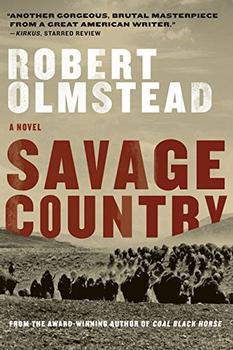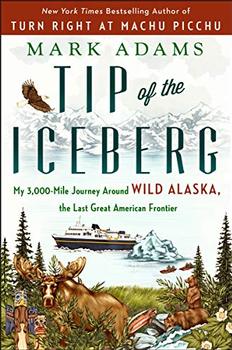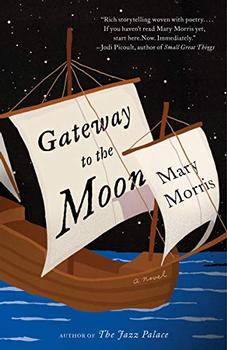Summary | Excerpt | Reviews | Beyond the book | Read-Alikes | Genres & Themes | Author Bio

A Novel
by Robert OlmsteadIn Savage Country, Robert Olmstead speaks to the American myths, legends, and ethos that originated with the Pilgrims and early settlers, was tested in the Civil War, and arrived at its last frontier with the expansion and settlements beyond the Mississippi River.
The plot of Olmstead's work is as simple as its theme is complex. In 1873, David Coughlin, a seemingly prosperous farmer-rancher on the Kansas prairie, has died after being kicked by "a big intractable stallion," one he was warned away from by his wife, Elizabeth. She's upset with her husband's carelessness, and then grows angry when she discovers that he was so deeply in debt to the local banker, Whitechurch, that she's now in danger of losing her land. Her worry is aggravated because so many people, mostly men who followed David into "the slaughterous American war," are dependent on the land's prosperity. David's brother, Michael, arrives, riding Khyber, a magnificent Arabian mare and accompanied by two loyal dogs. Michael has lived a life of adventure, traveling the world, of late mostly in Africa where "he thought to get rich in the ivory trade." Before even meeting Elizabeth, Michael pays off David's debts in gold, much to Whitechurch's chagrin. Later, not wanting to be obligated to Michael, Elizabeth decides to organize a buffalo hunt. There's a massive herd ranging south past the Deadline (demarcating Native American Territory from Kansas), into the Comanche country - that's north Texas and western Oklahoma, somewhere "between the north fork of the Canadian and Red Rivers, and from about the 100th meridian to the eastern border of New Mexico." Michael objects but Elizabeth is undeterred, so he decides to accompany her, fearing for her safety.
This simple plot frames an endurance story, an expedition lasting more than a year, with wild rivers to be crossed, prairie fires and blue northers (a sudden cold front) to be endured, bandits to be killed, and buffalo to be slaughtered by the hundreds on days when the big Sharps .50 caliber rifles grew so hot that hunters poured cooling canteen water down their barrels.
The big bull he shot, tormented and mystified, blew and pawed at the ground, throwing clumps of red earth high into the air ... Forming on the bulls lips and nostrils was a mass of bloody foam. This is a story of the snick-snick-snick of skinning knives being sharpened as blood-soaked men rip hides from magnificent beasts, careful to dig out the lead bullets to be melted and used to kill another animal. It is a tale of rag-clad freed slaves slipping from the lost woods where they've been hiding to ask to join the expedition.
Michael, silent, strong, tired of the killing yet obligated to Elizabeth, feeling "the passage of receding time," in spite of his moral qualms, is too real to be a John Wayne hero. Elizabeth, somewhat older than Michael, angry, growing into strength and independence as she endures privation, becomes heroic. Others tag along, prosper, fail, die, or slink away like Reverend Doctor Purefoy, whose ambitions to marry Elizabeth began at the graveside; or a man with the singular name of Aubuchon, "educated for the priesthood, but had never taken holy orders," content now to serve as chef. There are misfits and men near feral. "The old man who wore blue jays in his hat was hired and with him came his woman without a nose" - they poison buffalo carcasses and then collect the pelts of the wolves and coyotes that come to eat their fill.
All together, they are the voice of a laconic, subtle poet, singing. There is a touch of Hemingway in the story's structure, more of Cormac McCarthy as it turns a cold eye toward the violence, all laced with spare stark sentences shaping images from our history too often obscured by myth. The book is an elegy for America, a continent subdued by hard men, Colt revolvers, and Sharps rifles.
Olmstead's Savage Country has a moral authenticity, but it's also a lament, an elegy for the beauty of what was and for what should have been.
![]() This review was originally published in The BookBrowse Review in September 2017, and has been updated for the
September 2018 edition.
Click here to go to this issue.
This review was originally published in The BookBrowse Review in September 2017, and has been updated for the
September 2018 edition.
Click here to go to this issue.

If you liked Savage Country, try these:

by Mark Adams
Published 2019
From the acclaimed, bestselling author of Turn Right at Machu Picchu, a fascinating and funny journey into Alaska, America's last frontier, retracing the historic 1899 Harriman Expedition.

by Mary Morris
Published 2019
From award-winning novelist Mary Morris comes the remarkable story of a remote New Mexican town coming to grips with a dark history it never imagined.
Your guide toexceptional books
BookBrowse seeks out and recommends the best in contemporary fiction and nonfiction—books that not only engage and entertain but also deepen our understanding of ourselves and the world around us.